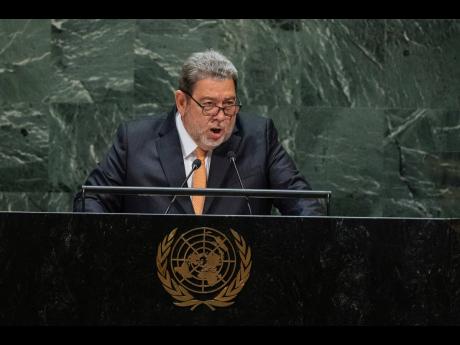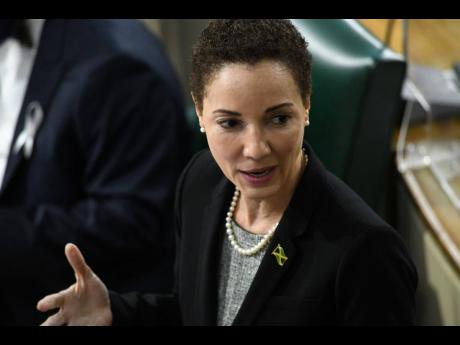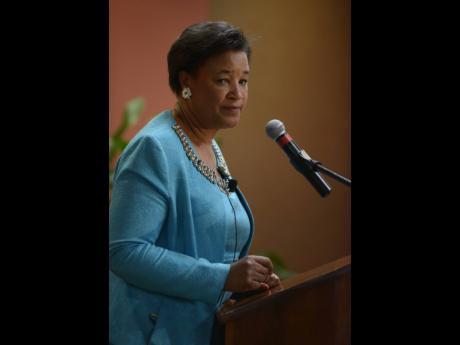Gonsalves hoping for amicable solution to Commonwealth secretary general candidate controversy
St Vincent and the Grenadines Prime Minister Dr Ralph Gonsalves remains hopeful of consensus on a candidate for the post of Commonwealth secretary general, after Andrew Holness, the Jamaican prime minister, threw a spanner in the works with his recent announcement that he would nominate Kamina Johnson Smith, the foreign affairs and foreign trade minister, for the post.
Johnson Smith’s nomination will pit her against Baroness Patricia Scotland, the Dominica-born controversial incumbent, for whose re-election bid the leaders of the 15-member community had expressed “overwhelming support” at their 33rd intersessional in Belize last month. Commonwealth leaders will elect a secretary general at their June 20-25 summit in Kigali, Rwanda.
In light of the Jamaican prime minister’s announcement, the CARICOM heads agreed at a special meeting on Wednesday to establish a five-member prime ministerial committee to explore an acceptable way forward, Dr Gonsalves told The Sunday Gleaner yesterday.
The committee, which consists of Jamaica and Dominica, as well as Belize, Guyana and St Vincent and the Grenadines, is to meet with both Scotland and Johnson Smith at a yet-to-be-determined date before reporting back to the wider body.
“[We want to move] forward as far as practicable with some unity and if we can’t achieve that, well, then, it will be done with good sense and with respect for everybody,” Gonsalves stressed.
Jamaica’s announcement drew a sharp response from Gaston Browne, the Antigua and Barbuda prime minister, who described it as a “monumental error”, while Roosevelt Skerrit, the Dominican leader, has written to all 54 members of the Commonwealth urging them to support Scotland.
However, one Caribbean prime minister, who did not wish to be identified because of the divisive nature of the issue, reminded The Sunday Gleaner that his counterparts at the intersessional were careful to state that Scotland had received “overwhelming support”.
“What the document said was there’s overwhelming support for Baroness Scotland but overwhelming doesn’t mean unanimous,” said the prime minister, suggesting that Jamaica, and possibly other leaders, were not on board with the majority.
This appears to confirm Holness’ statement to Parliament last week that there has never been a unanimous position of support for Scotland and that some member states had previously raised the question of whether an alternative Caribbean candidate should be identified.
BEEN THERE BEFORE
CARICOM has walked this road before, having found itself at the centre of a swirling controversy in the lead-up to the 2015 election for the post.
It was widely expected then that Sir Ronald Sanders, the Guyana-born diplomat, businessman and academic, who was nominated by Antigua and Barbuda, would have been the region’s choice.
However, Skerrit nominated Scotland, much to the annoyance of many of his counterparts, who pointed to the fact that Scotland had left Dominica at age two, dedicated her entire career to Britain and had never worked for Dominica or any Caribbean government or institution.
Sanders, who had the support of at least nine CARICOM countries – only Barbados and Dominica were known to have supported Scotland – eventually withdrew his candidacy, prompting the Antiguan prime minister to write a stinging letter to Freundel Stuart, then the Barbados prime minister, practically accusing Stuart of lying by stating that leaders had referred the matter to the bureau of heads.
Scotland, whose tenure was due to expire in March 2020 but was extended due to COVID-19, has had a highly controversial term at the helm of the London-based secretariat. She was branded ‘Baroness Brazen’ and ‘Baroness Shameless’ by right-leaning British media after signing off on a lavish refit worth hundreds of thousands of pounds at her mansion.
She was also strongly criticised by internal auditors for awarding a lucrative consultancy contract worth £250,000 to a company run by a personal friend.
In their report, the auditors had expressed concerns that the secretariat’s “acts and omissions” in relation to the contract – and other alleged failings that they identified – endangered “the integrity” of the institution and risk “serious reputational if not actual damage”.
The auditors also discovered that procurement rules had been waived by the secretariat on no fewer than 50 occasions over three years.
The United Kingdom, Australia and New Zealand have suspended funding of the secretariat’s “financial procedures” and are unlikely to support Scotland’s re-election.



